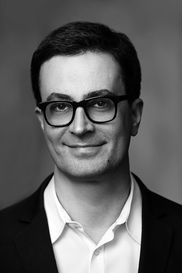 Photo by Beowulf Sheehan Photo by Beowulf Sheehan
I'm a Brooklyn-based writer, the author of Flights: Radicals on the Run (out in May; preorder here) and Finks: How the CIA Tricked the World's Best Writers. My writing appears or will soon appear in The New York Times, The Daily Beast, Harper's The Baffler, The Wall Street Journal, Newsweek, The Believer, Boston Review, Salon, The Sun Magazine, The San Francisco Chronicle, NPR Books, World Policy Journal, The New Republic, Dissent, New York Magazine, The Poetry Foundation, The Wire (India), Jacobin & The Village Voice.
I am a former features editor at Al Jazeera America and a founder and former editor-in-chief at Guernica, for which I won a 2017 PEN/Nora Magid Award for Excellence in Editing. My essays in The Baffler, Dissent and Salon were Notables, respectively, in Best American Essays 2017, Best American Essays 2015 & Best American Essays 2013. I curate and manage a literary series at Brooklyn Public Library's BPL Presents on its main stage, and help present cultural and civic programming throughout the library's 60+ branches. A graduate of Columbia University's School of the Arts/Writing Program, my poetry has appeared in The Paris Review, The Nation, and Agni. In 2003, I was awarded a “Discovery”/The Nation Prize by the 92nd Street Y and The Nation. In 2022, as part of my work at Brooklyn Public Library, I was part of a team that invited Joe Baker and Hadrien Coumans of the Lenape Center to present "Lenapehoking," New York City's first Lenape-curated exhibition at a New York City public institution, and together we published an anthology of historical essays, interviews and poetry to accompany the exhibit. With photographer Brett Van Ort, I also co-authored Minescape, a 2013 TED Talks ebook on landmine removal. A former board member of the Overseas Press Club, I was a multiyear judge of the Ed Cunningham Award for international magazine reporting. I have taught narrative nonfiction at the Writer's Foundry MFA program at St. Joseph's College in Brooklyn, as well as English and writing at Fordham University, Cooper Union, and John Jay College. I also teach "National Security Reporting: Secrets, Leaks & Whistleblowers" at the School of the New York Times' Summer Academy." I live in Brooklyn, known by its first people as Lenapehoking, and I'm working on a novel, and more nonfiction. NEWS I spoke to Tony Perrottet in the Wall Street Journal's Travel Magazine about progressive American Exiles in Mexico City, March 23, 2023 I spoke with Duncan Gammie for his podcast Dunc Tank on "The CIA v Art," Sept 25, 2022 John Train, Paris Review Founder, & Cold War Operative, Dead at 94, Alex Traub, New York Times, Sept 23, 2022 I spoke to Robert Scheer about Paul Robeson and right-wing riots against him in 1949 in my hometown of Peekskill, NY, Scheer Intelligence Podcast, KCRW, Aug, 5, 2022 I was honored to be quoted in a piece for Untapped Cities about the first Lenape-curated exhibit in New York, as hosted at Brooklyn Public Library's Greenpoint Branch, April 2022. I spoke about poets George & Mary Oppen, the FBI & the Cold War with Bob Scheer on Scheer Intelligence, Feb 5, 2021 I had the pleasure of Introducing Edward Snowden at Brooklyn Public Library, in conversation with the ACLU's Anthony Romero, CSPAN, Sept 26, 2019 Radio interview with Doug Henwood, Behind the News (33:33), KPFA/Jacobin Radio, July 11, 2019 Podcast interview with John Dolan & Mark Ames (preview), Radio War Nerd, March 21, 2019 Radio interview with Larry Bensky, Ideas and Ideals, KPFA-Berkeley, Feb 22, 2019 Radio interview with Doug Henwood, Behind the News (minute 26), KPFA/Jacobin Radio, Feb 21, 2019 "Joel Whitney & Michael Archer of Guernica awarded PEN's Nora Magid Award for Editing," Feb 22, 2017 Angela Chen, "Salman Rushdie on his latest 'wonder tale': 'We now live in a very strange time'," The Guardian, Oct 19, 2015 Patrick Iber, "Literary Magazines for Socialists, Funded by the CIA," The Awl, Aug 24, 2015 Christopher Lehmann-Haupt, "Peter Matthiessen, Lyrical Writer and Naturalist, is Dead at 86," New York Times, April 5, 2014 Adam Krause, "Did the CIA propagate rock n roll?" The Awl, Dec 18, 2013 Orion Jones, "Did Chinua Achebe Achieve a Global Canon of the Arts?" Big Think, March 25, 2013 Tess Elliott, "Cruel Landscapes: An interview with Joel Whitney," Point Reyes Light, March 21, 2013 Jennifer Schuessler, "Salon Article Rekindles Debate about Paris Review and CIA," New York Times, May 29, 2012 On Verso's Counterblasts, in which I stand in for Belen Fernandez, CSPAN/Leftforum, March 17, 2012 "Guernica: Lit Mag Beats the Odds," about my work on Guernica in Publishers Weekly, Oct 19, 2007 Art and Politics, commentary on NPR/KUOW, July 2007 See more here. |